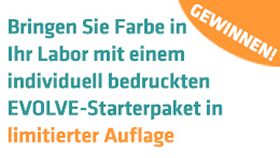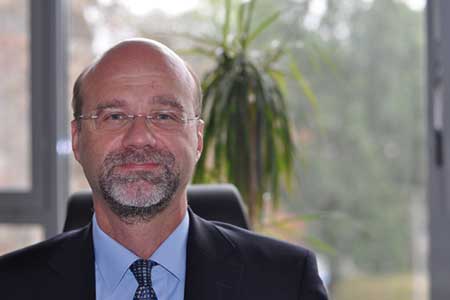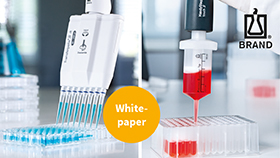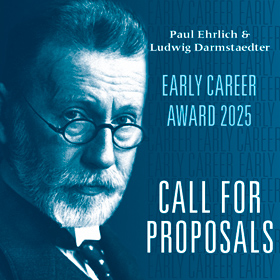Be Curious and Ask Odd Questions -
Interview with Thomas Henkel, CEO of Targos
Career strategies for young European scientists
by Ralf Schreck, Labtimes 01/2016
Page 1 | Page 2 | Page 3
From biology student to CEO of a successful company developing and applying clinical biomarkers, Thomas Henkel has surely made his way in the scientific world. Lab Times talked to him about his career and the challenges of running a service company in times of rapid technological changes and growing globalisation.
The German, Thomas Henkel, is co-founder and CEO of Targos Molecular Pathology GmbH. With close to 100 employees the company is headquartered in Kassel, Germany. Thomas studied biology at the Georg August University in Göttingen, Germany, and graduated in 1989 with a thesis on B-cell leukaemia. After a couple of detours and supported by a highly competitive fellowship from the Boehringer Ingelheim Fonds, he joined the group of Patrick Baeuerle at the Munich Gene Center as PhD student. For his work on nuclear transport and activation mechanisms of the Nuclear Factor Kappa B in immune cells, he was awarded a PhD title by the Ludwig Maximilian University in Munich in 1993.
A fellowship by the German Research Foundation (DFG) facilitated a two-year postdoctoral stay with the biopharmaceutical company Tularik in South San Francisco, USA. At that time, Tularik Inc. had just been established and focussed on novel medicines acting through gene regulatory mechanisms and Thomas conducted research on the activation of Epstein Barr Virus in B-cells.
In the following years, the diagnosis as well as the therapy of diseases became his top priorities. For his next career step, he moved back to Munich to lead MediGene, a biotech spin-off of the Munich Gene Center, through a successful initial public offering (IPO) as Vice President Research. Thereafter, he became Head of Biomedical Research at the Klinikum Kassel GmbH, out of which the Targos GmbH was formed in 2005.
Lab Times: What was your initial motivation to study biology?
Thomas Henkel: It was a deep interest in nature and my curiosity about what can be unravelled by studying biology.
Very early on you developed a keen interest in using molecular approaches to address disease development and in finding novel ways to combat diseases. What incited this preference?
Henkel: Following my general interest in nature, I tried to explore the full bandwidth of biology by pursuing a kind of “studium generale” in the first two years of my studies in Göttingen. Then I got the opportunity to work at the Max-Planck Institute for Experimental Medicine as a research student. I learned to use new methods in molecular biology and immunology and to apply them to leukaemia research. This opportunity, which led up to my diploma thesis, sparked my continuous enthusiasm for molecular medicine and signal transduction.
After a short period at a pharma company and a first unfinished doctorate you joined the lab of Patrick Baeuerle at the Munich Gene Center. He had just started his first own group after pioneering work in the lab of Nobel laureate David Baltimore. Why did you choose his lab and what influence did your time as PhD student have on your later career?
Henkel: I moved to Munich for personal reasons and got the offer of a Max-Planck PhD fellowship in a renowned cell biology research group at the Max-Planck Institute for Biochemistry in Martinsried. However, I quickly realised, that working with model organisms is not suited to satisfying my passion for molecular medicine. When I met Patrick Baeuerle, who had just started his research group at the Gene Center, he really sparked my enthusiasm by proposing a couple of research projects, which seemed very attractive to me. Unfortunately, at that time, no grants were available in his lab to finance my PhD thesis. Thus, I worked for a while as a research student in Penzberg for Boehringer Mannheim (now Roche) to make my living. During this time, I successfully applied for a PhD fellowship with the Boehringer Ingelheim Fonds, which enabled me to perform my PhD studies in Patrick’s lab. Although I had lost more than a year, it was the right decision. My work at the Gene Center turned out to be highly rewarding. I had to hit the ground running, since my project was highly competitive with some of the best research groups in the world working on similar topics. But in many cases, we prevailed and were able to put out a couple of widely received publications. In addition to many valuable scientific contacts made during this time, these publications laid the foundation for my further career and brought me into the position to have choices for my next career steps.
Page 1 | Page 2 | Page 3
Last Changed: 02.03.2016








